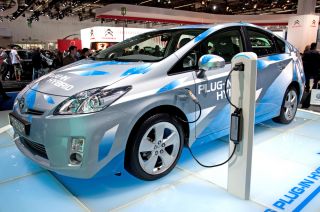Environment
Earth to Humans: Why Have You Forsaken Me? Perceived Risk
Climate change will keep advancing unless we slay the dragons of inaction.
Posted September 29, 2015
Why do we keep failing as a society to respond adequately to severe and growing climate change and other major environmental problems? In previous post, here, I set out to discuss all seven categories of psychological inertia discussed by the environmental psychologist Robert Gifford in his article, “The Dragons of Inaction: Psychological Barriers That Limit Climate Change Mitigation and Adaptation.”[i]
These dragons of inaction must be SLAIN for us to transition to a healthier, more sustainable world. The sixth group of dragons is termed…
Perceived Risk
Changing your behavior can seem risky. Leaving your normal patterns behind might set you up for some unknown and unwelcome outcomes at some point in the future. Many of us are hesitant to shift from what we usually do to new ways for this very reason. Those with the most fear are often the least willing to change. The bravest are the trendsetters of society.
In his article Robert Gifford identified six specific kinds of risk that may inhibit people from changing (and consequently inhibit them from even believing global climate change is a real problem that we can and should address):
Functional risk. Will your new choices even work? Will solar panels on your rooftop pay off? Will your electric car’s battery live as long as you were told it will? Will you be able to drive that car on all the trips you usually
![By Pujanak (Own work) [Public domain], via Wikimedia Commons By Pujanak (Own work) [Public domain], via Wikimedia Commons](https://cdn.psychologytoday.com/sites/default/files/styles/article-inline-half/public/field_blog_entry_images/256px-Solar_panels_on_a_roof.jpg?itok=_MWeL2Uo)
take (will it have a long enough range)?
Action: It can indeed be daunting to try some new product or service, but it can also be fun, interesting, and rewarding, particularly if it pays off financially and morally. Before making an investment of time and energy, do your homework to assure yourself of the likelihood that this new thing will work out in your life. If it’s a product you could borrow or rent first, try that. Do any friends or neighbors own it? Ask them about it. Read reviews and reports by current owners and testing companies. Read warranties.
But also keep in mind that many changes you can make to reduce your climate change impact are low risk: flying less, driving less, and eating less meat. The latter may be the most important, since industrial meat production is a huge source of climate change—razing forests to grow cattle feed, cattle belching and farting, transportation, and so on are major culprits. If you think you won’t get enough protein or other nutrition eating less meat (or even becoming vegetarian), check into the top athletes who are vegetarian, including Dave Scott, winner of the most Iron Man competitions: http://www.mnn.com/food/healthy-eating/photos/9-superstar-athletes-who-dont-eat-meat/fueled-by-vegetables.[ii] Again, do your research to learn what a healthy vegan or vegetarian diet might be for you.

Physical risk. Will this new way of life or technology physically harm me? Is riding my bike more dangerous than driving? Is taking public transportation and walking more dangerous? How will making this change affect my safety?
Action: Keep things in perspective. Regarding bike riding: biking may be more dangerous per mile of travel (because you don’t have the steel shell of a car around you), but you don’t normally ride your bike as far as you drive a car. And according to one report, counting trips made instead of miles traveled reveals biking and car driving don’t involve radically different levels of risk.[iii] When you weigh in the health benefits of the physical activity involved in riding a bike or walking to and from public transit, you’re likely to come out on top with the more active lifestyle of these alternatives. Cars make us passive (and sometimes aggressive!).
If you’re transitioning to bikes as a new mode of transportation, be sure to learn all the best and safest routes and observe safety rules, including helmets and proper lighting at night and perhaps even a reflective vest. Ride defensively—assume vehicle drivers can’t see you, as I do when biking around town.
Financial risk. “Green” solutions can cost money, and it’s not always clear that such an investment will pay off in conventional terms (as money saved or earned rather than environmental good done). Payoffs can take a long time, and products such as plugin hybrid electric vehicles (PHEVs) can sometimes be more expensive than a conventional car. Will there be a financial loss from the decision to make such investments?

Action: The canonical answer, to do your homework, applies here, too. As with any financial decision, research in advance can help determine whether you end up with a financial decision that will pay off. But also remember that uncertainties and risks complicate all sorts of investment decisions, not just environmentally explicit ones. Will the stock market continue to rise if I buy stock X? Keep in mind also that many “green” technologies such as rooftop solar panels are in some cases subsidized by the government, making their payoff more likely. (By the way, these are good investments for the government for many reasons, including that such subsidies stimulate green technology development and grow green industry, which in turn brings about more coalitions to support carbon regulation.[iv])
But also ask yourself, Am I doing this for my pocketbook only, or am I doing this for other reasons, too? Will this investment choice build upon my underlying values (technologies and products that may contribute to a healthier planet) or will it weigh on me by contradicting my values (such as investing in oil or tobacco companies)?
Social risk. People judge you by your choices all the time. You may wonder: Will people deride my choice, for instance, to put solar panels on my house? Will they invoke one of the three above-mentioned forms of risk—functional, physical, or financial—to question my judgment?
Action: If you’re confident you’ve weighed the other risks, you can stand on strong ground and act with confidence, backed up by your own values that direct you to do something good for the planet. Consider also your role in life. Change requires some risk, and if you think our current economy and lifestyle is damaging to the environment and harming future generations, perhaps you can be one of the trendsetters to lead the way. Remember, a large group of lemmings may run headlong off a cliff (accidentally, ignorantly following one another, not by intentional suicide); too many followers and not enough people willing to buck existing trends may doom modern society.
Psychological risk. In certain cases some vulnerable people might be hurt psychologically as a result of teasing or criticism associated with the previous category, social risk.
Action: If you’re particularly susceptible to the negative opinions of others, it might be best to avoid being a risk taker and perhaps choose the more conventional of the ecologically benevolent paths. Buying less stuff you don’t need (particularly airplane tickets!) is a great non-threatening approach with great ecological dividends. And feel free to be private about your choices. Consider following the lead of the environmental trend setters in your social group.
Temporal risk. This risk is related to the possibility of losing your investment of time spent planning and adopting new choices. It might take significant legwork to decide whether to put solar panels on your roof or to install a greywater system for your home. If the intended benefits are less than what you expected, you may feel you’ve wasted your time (and perhaps your money, too) researching and developing this climate-change-related choice.
Action: Not all investments in time and money pay off. But if you’re working toward a goal you believe in, a better, healthier planet—and you learn from the failures—your efforts won’t have been for naught.
Learn about my book: Invisible Nature
Follow me: Twitter or Facebook
My environmental blog: Finding the Human Place in Nature
Read more of my posts: The Green Mind
[i] Robert Gifford, “The Dragons of Inaction: Psychological Barriers That Limit Climate Change Mitigation and Adaptation,” American Psychologist, May – June 2011, pp. 290–302.
[ii]
[iii] http://www.vancouversun.com/health/Risks+cycling+walking+driving+contex…
[iv] http://enlab.berkeley.edu/winning-coalitions-for-climate-policy/ & http://www.sciencemag.org/content/349/6253/1170.full.pdf




